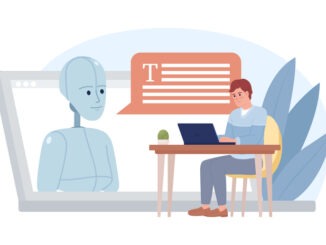
As AI tools become embedded in every corner of marketing, businesses must ask themselves: is speed worth sacrificing the voice they’ve spent years building?
CREDIT: This is an edited version of an article that originally appeared in SME News
With AI-generated content now available in seconds and popular platforms like Canva, HubSpot and Salesforce embedding advanced AI tools into their systems, marketing has never been faster or more accessible. For small and medium-sized enterprises, the appeal is obvious: speed, efficiency, automation and cost savings. But what’s often overlooked is the potential reputational damage caused by handing over too much creative and customer-facing responsibility to machines.
Speed Over Substance
It’s easy to see why AI tools are so tempting. Whether it’s generating a social media post, writing blog content, or crafting customer email campaigns, tools like ChatGPT can produce content in moments. But that convenience comes with a cost. Many businesses spend years – if not decades – building a brand voice, cultivating authenticity and carefully managing how they communicate with customers. Turning over that voice to a large language model that knows nothing about your unique values, tone, or audience is risky.
The Risk of Losing the Human Touch
One of the biggest dangers of over-relying on AI in marketing is the loss of genuine human interaction. Your tone, personality and the subtle nuances in your communications are what set your business apart. Replacing these with auto-generated messages, templated replies, or chatbot interactions can strip your brand of its soul.
We’ve all had that frustrating experience of calling customer service only to be met with an endless loop of bots and canned responses. The lack of human presence erodes trust and creates friction. For SMEs, trust is a valuable currency and once lost, is difficult to regain.
The Echo Chamber Effect
Another downside of using AI for content creation is repetitiveness. Generative AI tools are trained on vast datasets, meaning they tend to recycle familiar patterns, phrases and formats.
Content becomes generic, interchangeable and devoid of originality. Audiences begin to tune out. Instead of standing out in your market, your message blends into the background noise of the internet. Nowhere is this issue more obvious than in the overuse of emojis in AI-generated marketing content. A smiley face can’t replace a thoughtful sentence. A string of fire emojis won’t cover up for shallow messaging.
Your brand reputation is one of your most valuable assets. Poorly generated AI content, tone-deaf customer responses, or generic messaging can erode credibility quickly. A misjudged phrase or poorly handled query – especially in public – can damage stakeholder trust, impact customer relationships and even lead to regulatory scrutiny in sectors that demand higher accountability.
AI as a Tool, Not a Voice
This isn’t to say that AI has no place in marketing. Used strategically, AI can be an incredibly effective brainstorming partner or productivity booster. It can help shape ideas, generate early drafts and streamline repetitive tasks. But it should support human creativity – not replace it.
What AI can’t do is think for you. It can’t understand the unique heartbeat of your brand or craft content that truly resonates with your specific audience. That still requires time, thought and a distinctly human touch.


Be the first to comment